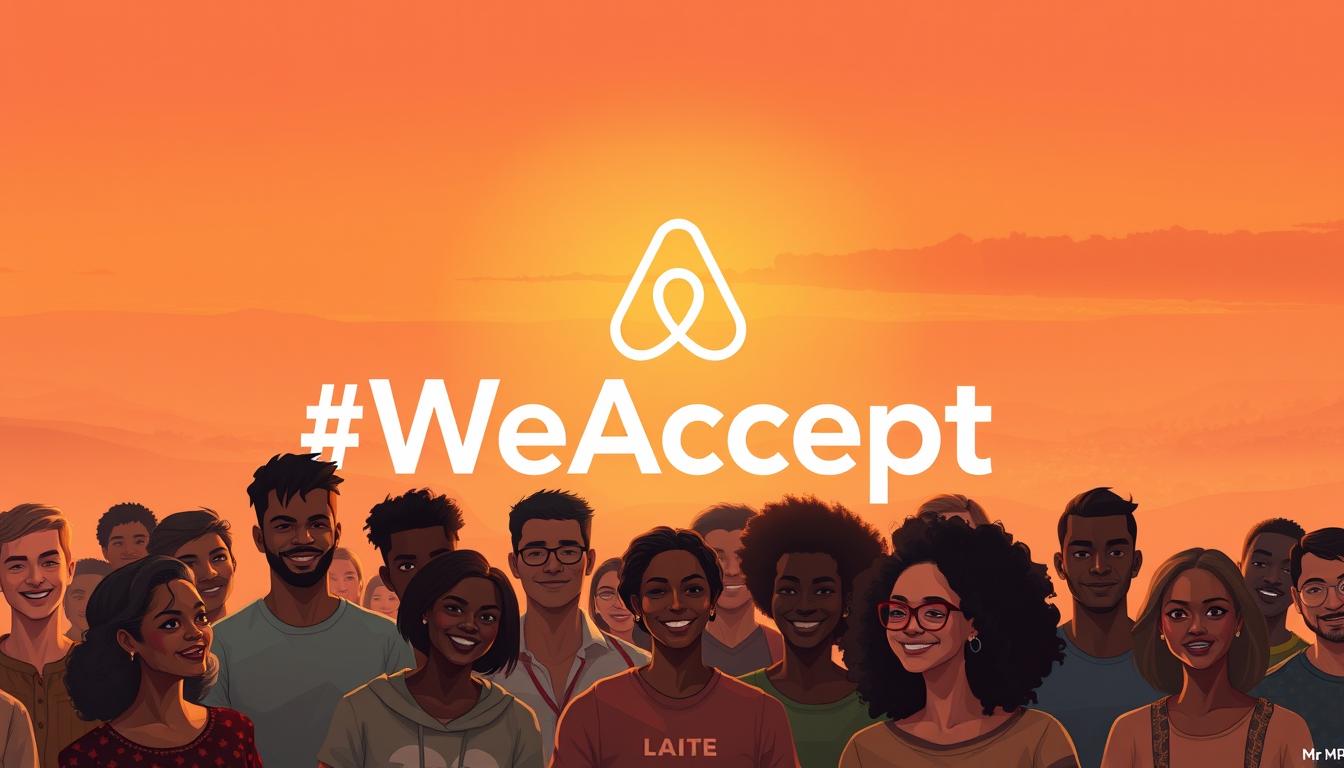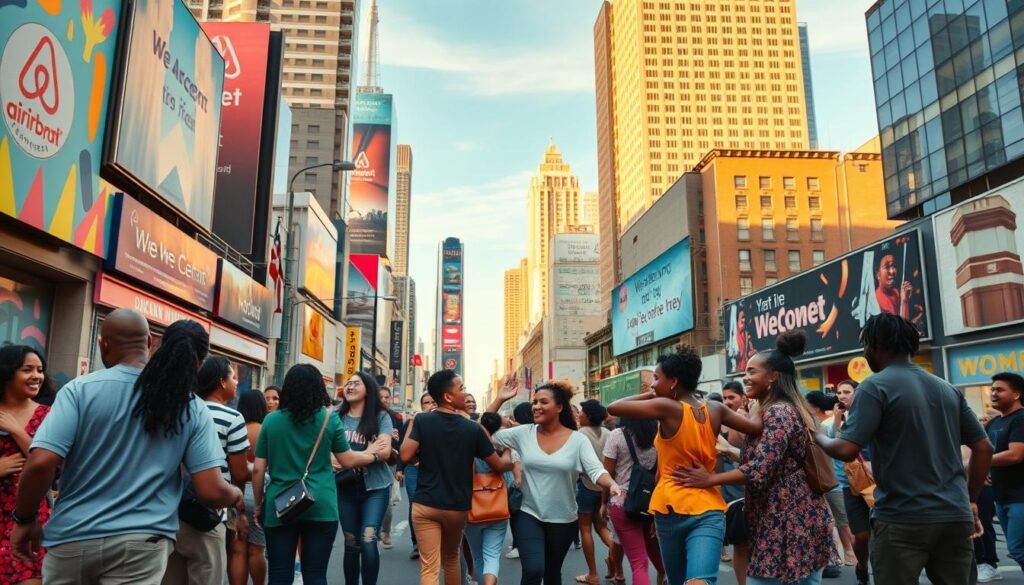
Did you know that a single Super Bowl ad could generate over $93 million in free advertising? That’s exactly what happened with the Airbnb #WeAccept Campaign during the 2017 Super Bowl. This initiative wasn’t just a clever marketing move—it was a powerful statement against discrimination and a commitment to inclusion.
Launched in response to growing concerns about prejudice and prejudice within the travel industry, the campaign aimed to restore trust and promote a message of acceptance. By leveraging the massive audience of the Super Bowl, Airbnb created a video that resonated deeply with viewers, sparking a conversation about respect and inclusion.
The results were staggering. The campaign earned an 85% positive reaction rate and spurred over 33,000 tweets in just the first half of the game. This level of engagement not only boosted Airbnb’s brand but also highlighted the company’s commitment to creating a more inclusive community.
Learn more about how this initiative set a new standard for marketing strategies and community commitment by visiting this link.
Understanding the Roots of the Campaign
The roots of the #WeAccept campaign can be traced back to Airbnb’s challenges with discrimination and prejudice on its platform. In 2015, the company faced significant backlash when studies revealed that guests with African American-sounding names often experienced higher rejection rates compared to those with White-sounding names. This issue highlighted deep-seated racial biases within the hospitality industry.
In response, Airbnb introduced its Community Commitment policy in 2016, which mandated that all users agree to treat everyone equally, regardless of race, religion, or other characteristics. This policy was a direct reaction to the growing concerns about discrimination and the negative social media reactions that followed. Harvard studies further supported these findings, showing widespread discrimination against marginalized groups, including the LGBTQ+ community.
The campaign’s timing coincided with the 2017 U.S. travel ban, which targeted predominantly Muslim-majority countries. Airbnb’s launch of the #WeAccept campaign during the Super Bowl was a strategic move to counter this ban and promote inclusivity. The campaign not only addressed discrimination but also provided support for refugees and displaced individuals, aligning with the company’s mission to foster respect and inclusion.
Learn more about how Airbnb addressed these challenges and developed its Community Commitment policy to combat discrimination and promote inclusion. For insights into effective marketing strategies, visit this resource.
Airbnb #WeAccept Campaign: Strategy, Execution, and Social Impact
The #WeAccept campaign stands as a prime example of how strategic marketing can drive both social change and business success. By airing a 30-second Super Bowl commercial, the company reached 113 million viewers, sparking widespread conversation and engagement.
Communicating Core Values and Brand Message
The campaign’s success hinged on its ability to clearly communicate Airbnb’s core values of inclusion and respect. By addressing discrimination directly, the company reshaped its brand message during a critical time. This strategic approach not only boosted brand loyalty but also attracted new users who aligned with these values.
Sarking Conversations on Social Media and Beyond
Social media played a pivotal role in amplifying the campaign’s reach. The hashtag #WeAccept became the most used advertiser hashtag during the Super Bowl, generating over 33,000 tweets in just the first half of the game. User-generated content and shared experiences further fueled the conversation, making the campaign a viral sensation.
Initiatives for Housing, Refugee Support, and Community Change
Going beyond mere messaging, Airbnb committed to tangible actions. The company pledged $4 million to the International Rescue Committee and vowed to provide housing for 100,000 displaced individuals over five years. These initiatives underscored Airbnb’s dedication to creating real, lasting change.
| Initiative | Impact |
|---|---|
| Donation to IRC | $4 million over four years |
| Housing for Refugees | 100,000 displaced individuals |
| Social Media Engagement | 90,000+ shares on Facebook and Instagram |

As Brian Chesky, Airbnb’s CEO, once said, “Inclusion is not just a word; it’s a commitment to action.” This campaign proved that when businesses lead with their values, they can drive both social and economic impact.
Measuring Success and Free Advertising Impact
The success of this initiative can be measured through several key metrics that highlight its impact and the value it generated. By examining these metrics, it becomes clear how the campaign achieved its goals and created lasting effects.
Key Performance Indicators and Social Media Engagement
The campaign’s effectiveness was tracked using specific indicators. Social media engagement was a crucial factor, with metrics such as positive-to-negative reaction ratios and the volume of interactions like tweets and likes. The initiative generated over 33,000 tweets during the Super Bowl, along with 500,000 likes across platforms, indicating a strong positive response.
- The positive-to-negative reaction ratio was notably high, showing widespread approval.
- Twitter engagement included 33,000 tweets, while Facebook and Instagram saw over 500,000 likes.
- Video views were substantial, further amplifying the campaign’s reach.
Quantifying Reach from the Super Bowl to Digital Platforms
Beyond the Super Bowl, the campaign’s impact extended across digital platforms. The ad reached an estimated 87 million impressions, significantly boosting the company’s online presence. This broad reach was further amplified by traditional media coverage and strategic transmedia approaches, ensuring the message resonated widely.

Learn more about how effective marketing strategies can enhance your brand’s impact and reach.
Conclusion
The #WeAccept campaign serves as a powerful reminder of how bold, value-driven strategies can create lasting social and economic impact. By addressing discrimination and fostering inclusion, the initiative transformed public perception and delivered significant free advertising worth $93 million. This campaign evolved from tackling prejudice to implementing robust community initiatives, such as housing for refugees and donations to the International Rescue Committee.
The metrics speak volumes: 85% positive reactions, over 33,000 tweets during the Super Bowl, and 87 million impressions highlight its effectiveness. These results underscore the importance of aligning company values with impactful strategies during crises. The campaign’s success shows how businesses can lead with their values to drive both social and economic impact.
For marketers, this campaign offers valuable lessons. Authenticity and clear communication are key to resonating with your audience. By embracing diversity and promoting inclusion, brands can create meaningful change while strengthening their reputation. As Brian Chesky, Airbnb’s CEO, once said, “Inclusion is not just a word; it’s a commitment to action.” This campaign’s legacy serves as a model for future cause-related marketing, proving that when businesses lead with their values, they can drive both social and economic impact. Learn more about the campaign’s impact on social responsibility and explore effective marketing strategies to inspire your own initiatives.

 Airbnb #WeAccept Campaign: How Inclusivity Drove $93M in Free Advertising
Airbnb #WeAccept Campaign: How Inclusivity Drove $93M in Free Advertising
Airbnb’s “We Accept” Campaign: Promoting Inclusivity Amidst Controversy
[…] more insights into how inclusivity drove significant engagement and brand value, visit this link to explore the campaign’s impact in […]